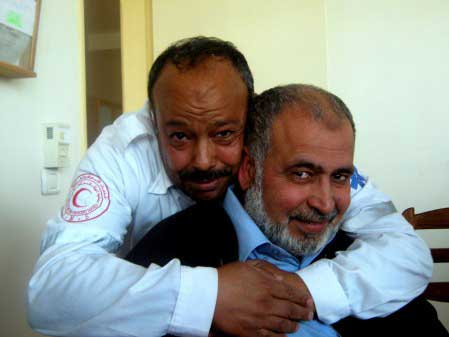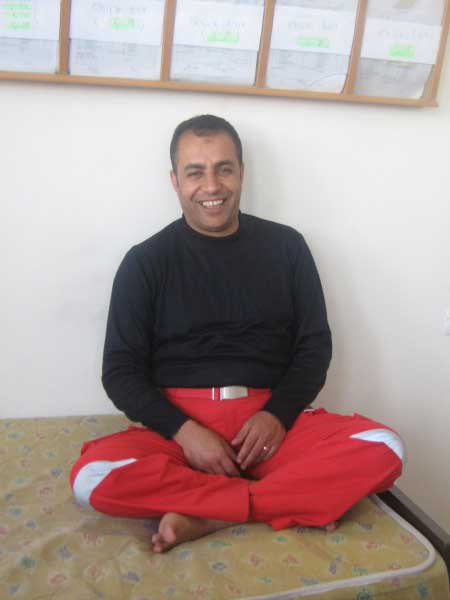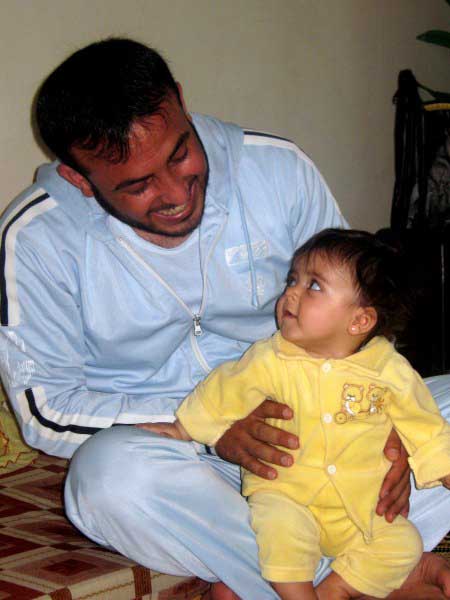Gaza: Affecting And Affected
By Eva Bartlett
12 April, 2010
In Gaza
Abu Basel (right) is one of the long-termers, having served over 20 years as a medic in  Gaza.
Gaza.
"Who will take care of people if not us? Someone has to do this work. Without medics, who will care for the injured? Everyone has something to contribute," he replied to the question: why do you do such dangerous work.
Dangerous work. Being a medic hardly seems dangerous…anywhere else. But in a place like Palestine, medics have to contend with more than tending to the injured or bringing in the dead. They have to be aware of Israeli soldiers’ shooting, shelling from Apaches, F-16s, tanks, the sea…
Having spoken with Abu Basel many times during and after the Israeli massacre of Gaza last year, I thought I’d heard most of his horror stories.
He is a calm man, when not driving the ambulance, and relates all his stories in the same laid-back tone, whether joyful or atrocious.
Upon request, he begins to recall some of the many dangers he was exposed to during the last Israeli attacks, not to mention the nearly 2 decades before that.
He recalls being with medics and 4 ambulances, 2 metres from the Al Kurdi house in the Jabaliya region when an F-16 bombed it.
"How in the world are you alive?" I ask.
"It’s in God’s hands," he replies.
He remembers a night in Beit Lahiya when they rushed to the site of a drone missile bombing.
"It was 1 am. We found the injured and brought the stretcher. A drone dropped another missile. Because it was night and there were not as many noises as during the day, I heard the sssss of the missile and we ran. The missile landed 1 metre from ambulance and 1.5 metres from the injured.
We ran back and grabbed the injured and drove. Two minutes later an F-16 bombed the house where we’d taken the injured from."
He relates another incident in Sheyjayee where, similarly, a drone attacked his ambulance, dropping a missile metres from his ambulance.
"We’d gone to retrieve 5 injured but were only able to take four before the missile struck. A man nearby who had come to help us load the injured was killed by the missile. The ambulance windows shattered and my colleagues were injured."
He then recalls 2 incidents when he says his ambulance had coordination via the International Committee of the Red Cross (ICRC) to reach an area the Israeli soldiers were occupying or preventing ambulances from accessing.
We went to Attatra with 3 Red Crescent ambulances and an ICRC jeep to bring out injured. When we reached the area, Israeli tanks started firing on us with machine gun fire. An ICRC employee started speaking with the Israelis via phone. 'You’re firing on us,’ he said and the Israelis denied it. But the tanks kept firing and we had to leave quickly because of the danger.
Another time, in Esserah area, Beit Lahiya, we again went with coordination. We went there along the sea rou and when near the area got on the microphone. 'If there’s anyone injured or anyone needs to leave or has an ill person or needs help, we’re ICRC and RC, we’re here to help,’ we told them.
There was a guy sitting outside his destroyed house. He told us 13 people from his family were inside the house (children, elderly, women). We began helping them, loading them into our ambulances. When the Israeli soldiers saw us helping the people, they began firing on us from their tanks. We hurried, took the 13 people into our ambulance. Two tires were blown out on one ambulance, but there wasn’t time to transfer the people or wait for other ambulances. They’d been in there, the 14 of them, since their house was destroyed a week earlier. They’d been without food for the week, just had water."

Iyad has been a medic for 16 years and equally has too many close calls to remember.
He shares some of his near-death escapes.
"I was working in the Red Crescent centre near Al Quds hospital, in the Tel el Howa area of Gaza City. After the Samounis were bombed, I went one afternoon to bring some of the martyrs. A zanana (drone) and tanks fired missiles on the road we were driving on. Six missiles, the closest was just 8 metres away. We had gone without coordination, because there were many martyrs and the area where we headed was somewhat far from the Israelis, maybe 500 metres away. I saw them and they saw me. We managed to take a marytr and leave."
Living in central Gaza, Iyad was among the medics completely cut off from his family during the massacre.
"For about a week I didn’t know anything on my family, the phone reception was so bad we couldn’t call each other. I live in Nussierat, and the road was severed by the Israelis, so I couldn’t get to them or communicate with them."
"There are so many incidents," Abu Basel says, "but I can’t remember them all, so many."
He repeats what most medics have said.
"We weren’t afraid, despite the danger. But it was hard. We weren’t sleeping, not eating well –there was no time to eat or sleep. Most didn’t see our families during the war, just a minute or two here or there."
While you’d think the most difficult time was the Israeli war on Gaza itself, because the medics were kept busy, most didn’t have time to think about the horrors of what they were seeing and experiencing.
"The hardest hardest was after the war," says Abu Basel. "During the war, I knew there was death. I’d see a body, then a different body. I woulnd’t dwell on what I had seen, would just think about what I had to do next.
But after the war, I began to have terrible dreams, I’d remember everything. For 2 months I dreamed horrible dreams, warplanes, the bodies, everything I saw in the war I re-lived in my dreams.
That was much harder than the war."
I remember Abu Basel telling me about finding Shahed Abu Halima, the infant girl killed by white phosphorous shelling, her corpse left for days as medics and family were unable to bring it out. Abu Basel was among the medics who uncovered the Abu Halima massacre, the charred remains of those family members killed in the shelling, and the gnawed body of Shahed, partially eaten by dogs.
"For the rest of my life I’ll remember that day. I’ll never get over it," he had said.
Do they feel scarred by their work and experiences?
"After 20 years of this, this kind of stress and work is normal.
But still, after this last war, the worst so far, people were extremely nervous and agitated. Some developed diabetes. Many found that after the war they got angry easily and were not sociable, didn’t want to speak to people… but now most are better.
Many medics can’t have babies. I know one who after 7 years still hasn’t had children.
Many take medications to have kids. It’s because they are very stressed, they see a lot of terrible things and begin to have problems with psychology."
After the massacre, a psychologist came to the Red Crescent to do workshops with the medics, says Abu Basel.
"For a month and a half, two days per week, we had sessions. He spoke with us, showed us exercises for relaxation, took us to the sea…
He gave us the will and spirit to work and live well.
The problem for us isn’t our psychology. We only need a break, to go somewhere else for a vacation and see something different. Go to Europe or somewhere, see a different life and try to forget what we saw.
For Iyad, there is no relaxation.
I sleep. Only. There’s nothing else to do. When I use the internet, there’s news. I watch TV or listen to the radio, and I hear news. I walk on the street, and all I hear is politics. There is no escape from this stress, no way to relax but to sleep."

Ahmed Abu Foul’s daughter Hola is 6 months old now. Married just one week before the Israeli massacre of Gaza erupted, Ahmed’s honeymoon was 23 days of hell in his dual positions of medic with the Red Crescent and with the Civil Defense, along with the hell of being separated from family.
Although only 27, Ahmed’s stories are too many to recount.
He re-visits some of them, which I marveled over before:
-The time he went to retrieve a martyr near a cemetery in Beit Lahiya. Israeli machine gun fire erupts at him and Ahmed is trapped, lying on the road, breaking for it and zig-zagging his way back to the ambulance.
-When they went to the site of a bombing in Sheik Radwan, north of Gaza City.
"There had been a drone strike on a house, they said there were injured.
I was looking to see if anyone injured. I was next to a 5 storey house, in the alley, when an F-16 hit the house next to me. It fell in the other direction, but the rubble fell on me.
I wasn’t badly injured, somehow, but my hair stood on end and I lost my hearing for 4 or 5 days," Ahmed tells with a grin.
But his most troubling recent injury is that inflicted as he attempted to evacuate a martyr from a Jabaliya apartment.
"The Israelis had fired numerous missiles on Hamouda tower, a 5 storey building in Jabaliya district. When we got there, we were told there was a martyr on 5th floor. I was the first to enter, everyone else was afraid. I found the body and Dr Issa Salah came up to help.
We were carrying the corpse down the stairs when the Israelis fired on us. The bomb blast decapitated Dr. Issa. His head hit me in the back of my head . I thought I’d been hit by shrapnel or something. Now I’ve got shrapnel in my head, but its bone shrapnel, from the dr. Issa. And shrapnel in leg from the bomb blast.
In a society where nearly everyone suffers from the continuous Israeli attacks, invasions, and wars, venting is not easy, and going to a psychologist is not the norm.
"After the war, I became extremely, extremely nervous. I was agitated and got angry easily. Sometimes if someone was making noise or annoying me I’d want to hit them," he says, still smiling his open smile.
"I was never rested. When I’d wake, I’d still feel like I hadn’t slept.
Until today, I still have nightmares from the war.
I went to a doctor. Every 2 days I saw her. If I hadn’t gone I would have been completely destroyed long ago.
We talked about my feelings. I just talked and talked, no medicine, just talking. By the end she said I was fine.
Some people are afraid to go to a therapist. Others might say they are crazy. But I know I wasn’t crazy, I just needed to talk, needed to fix my psychological state."
And like the others, Ahmed longs for a reprieve, even for a week.
"If I could just leave Gaza for one week, breathe a different air, all my psychological problems and stress would go. Even if I just went to Cairo."


